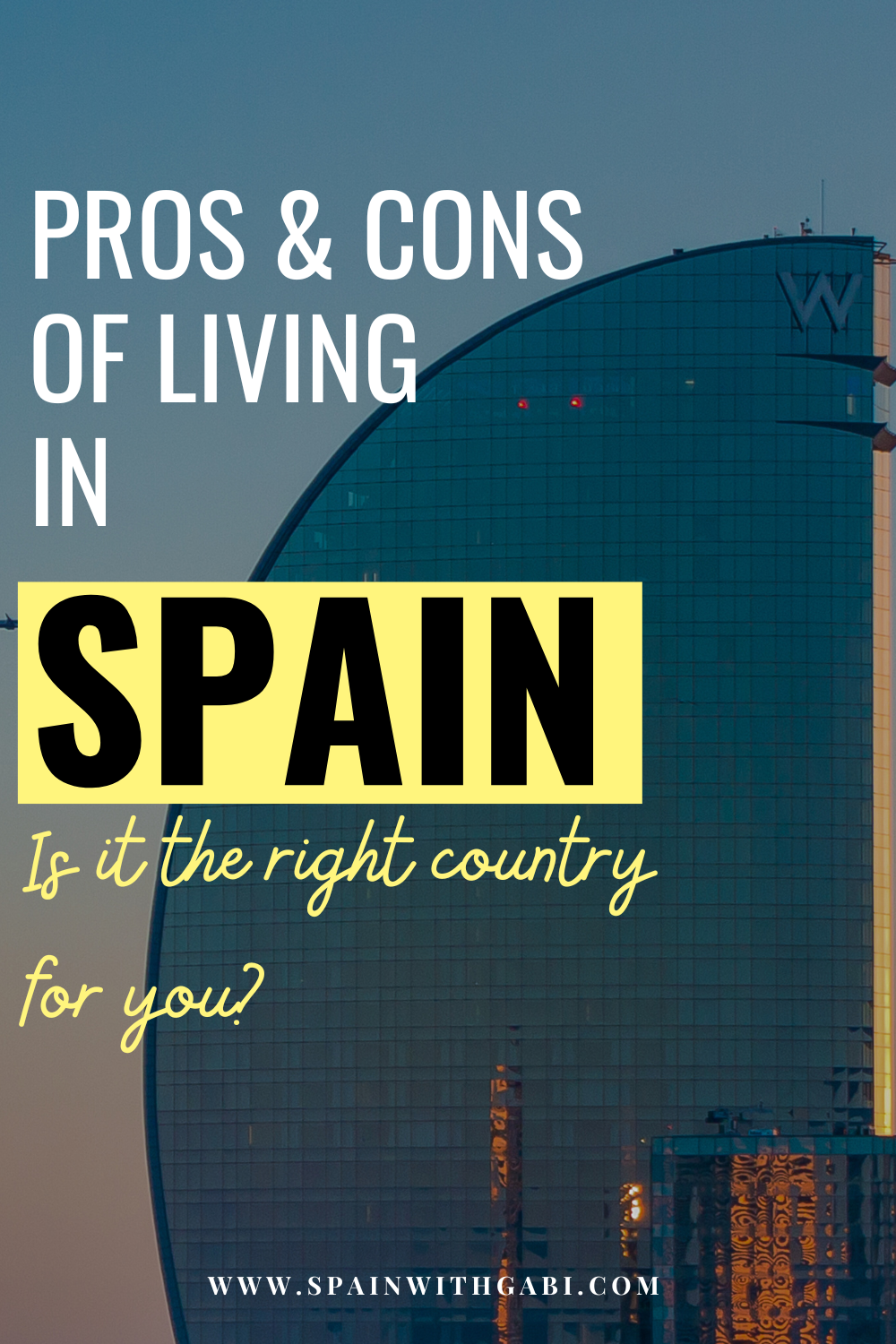
Whenever I tell people that I moved to Spain more than 8 years ago, I receive a lot of questions: “How is the quality of life in Spain?” “How is the expat life in Spain?” “Is relocating and living in Spain expensive?” “What are the Pros and Cons of living in Spain?” If you are currently in the same position, then you came to the right place.
In this blogpost, we will talk about the benefits and disadvantages of living in Spain. The whole truth, without sugarcoating and just saying “Being an expat in Spain is AMAZING”. Because while I do enjoy my live in Spain, I do believe that it does not suit everyone. Depending on where you are from, Spain can be very different from your home country. And believe me, you will experience many culture shocks in Spain.
If you are currently debating whether moving to Spain could be an option to you, keep reading. I will tell you everything you need to know about life in Spain. The pretty, the ugly, and even the things you did not expect.
So let’s jump into it: Here are the pros and cons of living in Spain, written by someone who moved from Germany to Spain in 2016.
Affiliate links may be sprinkled throughout the free content of this blog post. If you purchase from one of the links I may receive a small commission while the price for you stays the same. This helps me cover the costs of The Lithuanian Abroad. Gracias!
Other blog posts about living in Spain you have to check out:
How to find a (corporate job) in Spain: This guide features everything you need to know about working in Spain. This is how I was able to find a corporate job in Spain and advance my career.
How to find an apartment in Spain: This post features everything you need to know about finding and renting an apartment in Spain
Spain’s tipping culture: To tip or not to tip? This guide tells you everything about when and how much to tip in Spain
Let’s start our list of “Pros and Cons of living in Spain” with the clear benefits: Quality of life, Outdoor lifestyle, healthcare and more!

1. You will love the Mediterranean Climate and outdoor lifestyle
After moving to Spain, I cannot stress enough how much my perception of the weather changed. I used to live in Germany, which meant many grey rains with the occasional rainfall, dark winters, a lack of sunshine, and low levels of vitamin D.
I currently live in Barcelona and enjoy around 300 days of sunshine every year round. While it does cool down in Spain in winter, the sun makes up for it. Especially in the coastal areas like Barcelona, Alicante, or Valencia, the winters are very mild.
And because of this beautiful sunny weather, you will see that Spanish people have a very outdoorsy lifestyle. I spent so much more time outside than I did back in Germany. You can do outdoor sports the whole year round and meet your friends without being scared that rain will destroy your plans.
Spain offers more than 300 days of sunshine a year. The most popular destinations for expats in Spain are Barcelona, Valencia and Madrid.

2. Spain’s affordable healthcare system: The biggest benefit of living in Spain
Spain has universal healthcare, and it was ranked one of the best in Europe. More than deserved, in my opinion. Statista even calls Spain “One of the healthiest countries in the world”,
When I moved to Spain I was surprised by how easy it was to receive medical care. And it does not stop here. If you ever need prescription medicine, you will be surprised by how affordable it is. Many sources praise Spain’s national healthcare system, and I want to highlight it here, too.
But again, that is not everything. Spain’s healthcare system does keep you paying in case you get sick and are not able to work. Overall, Spanish healthcare has a very good standard and is very affordable. Yes, it is paid by your taxes, but you know you will taken care of in case you do get sick.
Spain’s social security system has you covered in case you get sick. And Spain’s maternity leave policy has to be mentioned as well: 4 months of paid leave for new mothers!
3. Cultural Heritage, UNESCO sites, Spanish history, and more
One of the things I love most about Spain is its rich culture, festivals, celebrations and other traditions.
Can you believe that Spain is home to 49 UNESCO World Heritage sites? One of my favorite fun facts about Spain. It does not matter where you live in Spain, I can assure you that it will never get boring living there. Living in Spain you will learn so much about Spain’s culture and history. You will find yourself exploring the amazing museums in Spain, and eating tapas at your favorite taberna in no time.
Oh, and the Spanish love how to celebrate. Yearly events include “Las Fallas” in Valencia, the “Feria de Sevilla” and a huge pride celebration in the capital of Spain (Make sure to put this party on your Madrid bucket list!). And of course, as an expat in Spain, you can participate in all of them!




4. Pros and Cons of living in Spain: Spain’s efficient public transport
If you ever spoke to a person living in Germany, then you know there is nothing we hate more than taking a train in Germany. Every single German can tell you a traumatizing experience about the German train system. Well, but not in Spain. Not only is Spain’s public transportation system great, Spain is also incredibly well connected by train. And guess what?! Train rides in Spain are affordable and a nice experience.
Spain is home to the AVE high-speed trains. During the last years, more train companies like OUIGO and Iryo started operating in Spain as well. More competition means lower ticket prices. And if you book your train tickets in advance, you can find tickets to go from Madrid to Barcelona for only 15€.
Public Transportation in Spanish cities is usually great too. I lived in Madrid and currently live in Barcelona and can confirm that both cities have a great public transport system. As a resident in Barcelona, I currently pay around 45€ for a 3-month public transport pass. How great is that?!
If you want to compare train prices in Spain I would recommend checking out Omio. There, you have all companies in one app and can compare prices and times
5. Cost of living in Spain in smaller towns, here comes the whole truth
As someone who has lived in Spain for several years now: Spain is not this “super cheap” and “affordable” country as it used to be. Cost of living and rent in Spain increased a lot during the last few years. But compared to other countries in Nothern and Western Europe and the United States, the cost of living in Spain is usually lower.
When I say “usually” I mean mostly small towns in Spain, but not Madrid and Barcelona. And of course, it always depends on what you are comparing it with. If you are comparing it with other high-income countries, yes, you might think that living in Spain is cheaper.
To give you some examples of living in Barcelona:
- For public transport, I pay 42.70€ for a 3-month ticket
- For a lunch menu, you can pay 14€-20€
- A small beer in a bar will cost 2-2.20€
- A glass of wine will cost 3-6€

6. You need Spain’s work-life balance in your life
I know it’s cliche, but there is some truth in it when people say “People in Spain work to live, and don’t live to work” Growing up in Germany, I am feeling this so much. Once you relocate to Spain, you will find yourself being so much more spontaneous and make plans to hang out with people on the very same day. In Germany, forget about it.
Apart from that, Spain has a very generous 22 holidays/year, once you start working in Spain. And many companies give more holidays to their employees. I know people who benefit from a total of 30 (!) holidays per year, but again it depends on your employer.
What I especially enjoy is that people meet up after work, even during the week. And you will find Spanish people to be very spontaneous and outgoing.
Compared to other countries, Spain definitely has a great work-life balance. You can add that to your list of “pros and cons of living in Spain”.

7. Pro of living in Spain: You will fall in love with the Spanish gastronomy
There is something that I realized after moving to Spain 8 years ago: I am eating healthier and more local.
And that makes sense! Because Spanish food is very healthy, includes fresh vegetables, fish and tons of vitamins. Spanish people also lack the typical sweet tooth, so you will not find as many sweet dishes and unhealthy products as you can in other countries. I always complain about the lack of sweet desserts in Spain, but honestly, it is probably better and healthier like that.
Another benefit of living in Spain is that restaurants and supermarkets in Spain offer different products for people with allergies and intolerances. If you go to Spain’s popular supermarket “Mercadona” you will see that it has a generous section of celiac and lactose-free products. Spanish cuisine is one of the BIG plus points of living in Spain.




9. Making friends in Spain? Easier than you might think
There is something that people do not usually mention when discussing the “pros and cons of living in Spain”, but in my opinion, it is very easy to meet people and make friends in Spain. And I think we already discussed the reason for that: Due to the good weather and Spain’s outdoorsy lifestyle, you will end up spending more time outside. That is how you meet and connect with other people. And then boom, friendships happen.
Compared to Germany, where people only make plans during the weekend, I found it SO MUCH easier to make friends in Spain. And this will make your first years in Spain so much easier.

Pros and Cons of Living in Spain: The Disadvantages, The Ugly, What No One talks about
1. Lower Salaries a Spain, is that a problem?
I get so many messages on my Instagram where people ask me how I deal with the low salaries in Spain. How do I live here? Am I happy here? How do you get a higher salary in Spain? I am currently earning 80k in the United States, and I do not want to accept a salary cut. What can I do?
And the answer is: I live on a Spanish salary just like other people in Spain live on a Spanish salary. I do not mean to be harsh, but I feel like you have to think about what do you prefer: Your home country’s salary, and life in your home country. Or a Spanish salary and a life in Spain? Because the truth is, it might not be possible to have both.
How high are salaries in Spain?
Depending on the sources you check, the average salary in Spain in 2024 is around 27.000-30.000€/year, and around 2.300€/month gross. Of course, this depends on the city you live in, the industry and your level of expertise. Please look at this and compare it to your local country.
If you are looking for sources for what the average salary in Spain is, you can find more information here and here.

I wrote a complete guide about finding a corporate job which you can find here. Find everything you need to know about the Spanish job market, Spanish salaries and my personal strategy you can use to find a corporate job in Spain.
You can find it here!
2. Spain’s difficult job market: How to find a job in Spain?
Different sources are saying that Spain has one of the highest unemployment rates in Europe. There are different reasons for that: The economic crisis from 2008 hit Spain hard, and Spain never seemed to fully recover from it. Even I have to admit that finding a job in Spain is not always easy, but it is not impossible.
I do not agree with people saying that the Spanish job market is “super bad”, because the truth is that it is VERY competitive. There are job offers available, but you will find hundreds of people applying for the same role.
During the last few years, so many international companies have opened subsidies in Spain and look for international talent. For example, in Barcelona, we have many tech companies like Confluent, Mongo DB . In Madrid, we have international companies like American Express, Tiktok, or Make.
If you speak English, and maybe even another language you have very good chances on the Spanish job market. Check my guide above for more information about finding a job in Spain.

3. Pros and Cons of living in Spain: Language barriers, different languages, accents and more!
What is going to sound obvious is actually one of the biggest challenges of moving to Spain: Learning Spanish. And when we talk about learning the local language, sometimes it is not just Spanish. It could also be Catalan, Euskera or Valencia. Did you know that Spain has 4 official languages?
Can you move to Spain without knowing Spanish?
I moved to Spain without knowing Spanish. And looking back, it was a huge mistake. I used to live in León, the North of Spain, which was not exactly a cosmopolitan city, and I struggled SO MUCH. While the situation might be a bit easier in Madrid or Barcelona, I really do recommend learning Spanish before moving to Spain. Compared to other Western European countries, you will see that English will not help you as much in your everyday life…
And to already prepare you for it: Learning a language takes time, and there will be a lot of frustration and misunderstandings. If you already know that you are going to move to Spain soon, I would recommend doing a language course, online or in-person. Believe me, it will make your arrival in Spain and the first months so much easier!

4. Pros and Cons of moving to Spain: Brace yourself for Bureaucracy
Bureaucracy sucks in every country. And I am pretty sure that it will be annoying anywhere you go, not just in Spain. But the bureaucracy in Spain is known to be an absolute nightmare and to not always make sense. And if you think that people working at governmental institutions will speak English when assisting you, I can already tell you they do not.
Especially after the pandemic, it became very difficult to get government appointments for the easiest things: Padrón (Registration at your address), NIE (registration number for foreigners), or anything related to visa questions. Do not be surprised when you try to get an appointment and it says that there are no appointments available. And there is nothing you can do about it, only try again tomorrow.
You need to be very patient when it comes to governmental appointments and bureaucracy. And if appointments are needed, do not wait until the last moment. Schedule them in advance!

5. Cons of Moving to Spain: Rent prices in bigger cities
I will make this one short: If you want to move to Valencia, Madrid, or Barcelona, prepare yourself to pay A LOT for rent.
For example, rent prices in Barcelona:
- rooms in Barcelona currently start at 600€/month
- a tiny studio in Barcelona currently starts at 900-1000€/month
The rental prices in Madrid increased over the last years as well. If you want to rent a flat by yourself in Madrid, you will have to pay more than 1000€/month. That is one of the challenges for expats in Spain! Spoiler: My friends in Berlin pay so much LESS in rent than I do living in Spain. But of course, their salaries are so much higher than mine…
If you want to check rental prices in Spain, I would recommend looking at the website idealista.es. That is where everyone in Spain looks for apartments, both for renting and buying
If you move to smaller towns in Spain, rent and monthly expenses will be much lower. But overall, Spain is not the incredibly affordable country as it used to be. I think it is very important to adjust expectations when you move to Spain.

6. Spain in summer: August, when the whole country shuts down
August is by far the hottest month in Spain, which is why many large enterprises and governmental institutions in Spain make their employees take holidays and therefore only operate very minimal hours: A true public services shutdown. This counts for all governmental institutions e.g. post offices. When I moved to Spain I was surprised to find out how many companies expect their employees to take holidays in August.
You will see many restaurants, hairdressers or other services closed or operating limited hours in August in Spain. So if you think about doing something important during the month of August, like finding a job or looking for an apartment, you will have to postpone that to September. August is a month to go to the beach in Spain, enjoy the holidays and unwind.
When I arrived to Madrid in 2017 I was desperately trying to find an internship in July and August and was so disappointed I received no answers from companies. But all the answers came in September, once everyone in Spain was back in their offices.

Frequently Asked Questions: Pros and Cons of Living in Spain, Digital Nomad Visa & Recommendations
What difficulties do expats in Spain face?
Difficulties for expats in Spain include bureaucracy, different schedules, lower salaries than in other European countries, and a language barrier. But if you care about quality of life, and beautiful weather and want to learn more about Spanish culture, you will enjoy living in Spain.
Do expats enjoy the daily life in Spain?
Expats enjoy the daily life in Spain, thanks to the amazing weather, delicious Spanish cuisine, and friendly people. If you enjoy a lifestyle where you spend a lot of time outside, do sports and enjoy the sun, you will like it, too.
Does Spain have a Digital Nomad Visa?
Yes, Spain has a digital Nomad visa that you can apply for! You can find more information about it here. This is currently one of the best opportunities to move to Spain for expats.





Leave a Reply